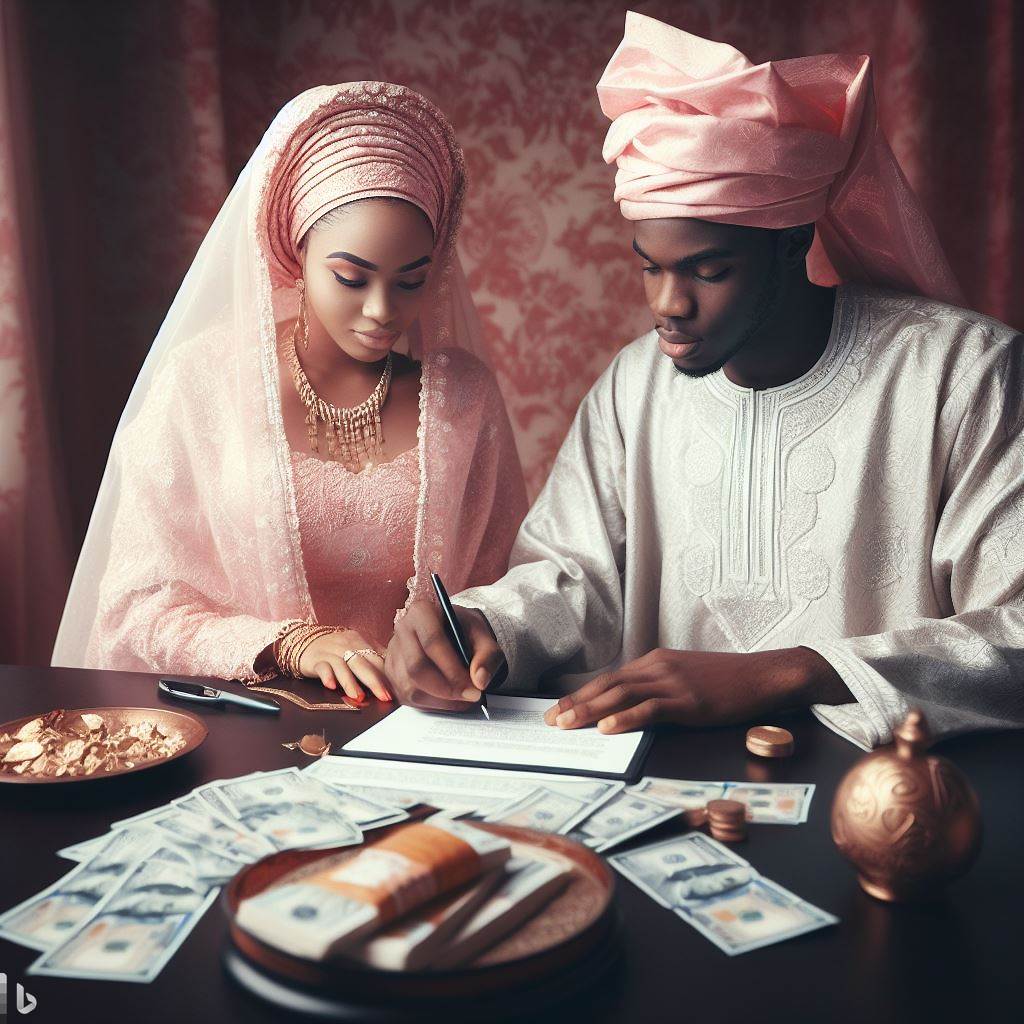Introduction
A marriage contract serves as a legal agreement outlining the rights and obligations of spouses.
It provides clarity and certainty in various aspects, including property division, financial matters, and potential child custody arrangements.
Drafting a fair marriage contract is crucial to ensure a balanced and equitable arrangement for both parties.
Importance of drafting a fair marriage contract
Drafting a fair marriage contract holds significant importance due to the potential complexities that may arise during a marriage.
By clearly defining expectations and responsibilities, it helps prevent misunderstandings and future disputes.
Such a contract allows couples to address potential issues in advance, protecting their individual rights and interests.
In the absence of a clear contract, state laws may dictate asset division and other matters during divorce proceedings.
This can lead to an unfair distribution, leaving one party at a disadvantage.
A well-drafted contract ensures that both spouses have a say in the division of property and finances, ensuring a fair outcome if the marriage ends.
Additionally, a fair marriage contract can address financial matters, such as debts and spousal support.
It allows couples to create a mutually agreeable arrangement, taking into account factors such as income disparities and future earning potential.
This helps prevent disagreements or potential financial stress later on.
Moreover, a marriage contract can establish guidelines for child custody and support, providing both parents with a voice in important decisions about their children’s upbringing.
This promotes stability and reduces conflict, prioritizing the best interests of the children.
Overall, by drafting a fair marriage contract, couples can safeguard their rights, maintain transparency, and foster a solid foundation for their future together.
Understanding the Need for a Marriage Contract
Marriage contracts and traditional vows differ significantly:
- Marriage contracts are legally binding, focusing on rights, responsibilities, and financial aspects.
- Traditional vows center on love, commitment, and emotional connection, reflecting personal and spiritual beliefs.
- Marriage contracts safeguard interests through financial details, including property, assets, and debts.
- Traditional vows emphasize mutual understanding, support, and love, irrespective of financial circumstances.
- Marriage contracts provide detailed legal frameworks, covering property division, child custody, and more.
- Traditional vows are symbolic and less explicit, highlighting emotional bonds.
- Marriage contracts involve negotiation and drafting by both parties and may require legal consultation.
- Traditional vows are exchanged during the wedding ceremony without negotiation, signifying love and commitment.
- Marriage contracts offer tangible legal protection, ensuring equitable wealth distribution in case of divorce.
- Traditional vows carry emotional significance, witnessed by friends and family, deepening the couple’s emotional bond.
In summary, marriage contracts focus on legal and financial aspects, while traditional vows symbolize love and commitment, fostering emotional connections.
Both are crucial in marriage, balancing practical considerations with emotional depth.
Understanding these distinctions helps couples navigate marriage with clarity and mutual understanding.
Read: How to Choose the Perfect Marriage Ring in Nigeria
Key Elements to Include in a Marriage Contract
Creating a marriage contract is crucial for a fair partnership:
- Financial Responsibilities: Define income, expenses, debts, savings, and investments. Plan for shared financial objectives.
- Property Rights and Division: Discuss asset ownership, including premarital assets, inheritances, and future acquisitions. Clearly outline division methods.
- End-of-Marriage Arrangements: Address alimony, child custody, and visitation rights. Plan for dispute resolution or mediation.
- Mutual Expectations and Responsibilities: Define household chores, child-rearing, and career decisions. Encourage personal growth and individual goals.
In fact, a comprehensive marriage contract establishes transparency, protects assets, and ensures a harmonious partnership, leading to a successful and fulfilling marriage.
Read: Top 10 Marriage Ring Designers in Nigeria
Seek Legal Advice
Consulting a family lawyer ensures a fair marriage contract:
- Legal Expertise: Lawyers specialize in matrimonial law, ensuring comprehensive and equitable agreements.
- Personalized Guidance: Tailored advice minimizes conflicts and reflects couples’ intentions accurately.
- Navigating Legal System: Lawyers guide couples through laws, explaining terms and ensuring compliance.
- Objective Negotiation: Lawyers act as intermediaries, resolving issues fairly and balancing emotions.
- Added Protection: Well-drafted contracts offer security, expediting resolution in case of disputes.
- Legally Sound Agreements: Lawyers guarantee enforceable, compliant, and legally binding contracts, upholding rights and interests effectively.
In short, involving a family lawyer guarantees a legally sound, fair, and secure marriage contract, benefiting both parties.
Read: How Modern Nigerian Literature is Rethinking Marriage

Communication and Compromise
Open, honest communication is vital in crafting a successful marriage contract:
- Establish trust and understanding.
- Share expectations, concerns, and desires openly.
- Actively listen and validate your partner’s perspective.
- Engage in meaningful conversations throughout the drafting process.
- Consider a mediator or marriage counselor, if necessary, to facilitate communication.
- Use clear, concise language in the contract to avoid misunderstandings.
- Discuss negotiation and compromise, ensuring both feel heard and respected.
- Identify key compromise areas, such as finances and responsibilities.
- Prioritize core needs and communicate honestly without rigidity.
- Seek win-win solutions and remain open to adjustments.
- Focus on long-term happiness over short-term gains.
- Maintain a healthy, respectful relationship.
- Practice empathy and compassion in conflicts.
- Commit to constructive conflict resolution.
- Seek professional help if conflicts persist or escalate.
- Emotionally check in and support each other.
- Celebrate milestones and strengthen your bond.
- The contract reflects values and aspirations, beyond legalities.
- Periodically revisit and revise the evolving contract.
- Use the process to deepen your bond and commitment.
In essence, communication and compromise are integral to crafting a fair marriage contract, fostering a strong foundation for the marriage.
Read: Marriage Therapy Books: A Resource Guide for Nigerian Couples
Delve into the Subject: Economic Impacts on Marriage Decisions in Modern Nigeria
Regular Review and Updates
In the journey of marriage, drafting a fair and comprehensive contract is essential.
However, as time goes on and circumstances change, it is equally important to review and update the marriage contract periodically.
Regular review and updates help ensure that the contract remains fair, relevant, and in line with the changing goals and needs of both partners.
The Importance of Periodically Reviewing and Updating the Marriage Contract
1. Staying Ahead of Changing Circumstances
Life is unpredictable, and circumstances can change in the blink of an eye.
By periodically reviewing and updating the marriage contract, couples can address potential conflicts or issues that may arise due to changing circumstances.
2. Adjustments Based on Changing Goals
As individuals and as a couple, goals and aspirations evolve over time.
A regular review allows couples to ensure that their marriage contract aligns with their current goals and provides a strong foundation for their future together.
3. Addressing New Legal and Financial Considerations
Laws and regulations related to marriage, prenuptial agreements, and financial matters may change over time.
Regular updates to the marriage contract help couples stay in compliance with the latest legal requirements and take advantage of new opportunities.
The Need for Adjustments based on Changing Circumstances or Goals
1. Financial Changes
Significant changes in income, assets, or debts can impact the financial aspects of a marriage.
By reviewing and updating the contract, couples can ensure that the financial provisions remain fair and equitable.
2. Career or Business Changes
Changes in careers, starting a new business, or entering into partnerships can alter the financial and legal obligations within a marriage.
It is important to review and adjust the contract to reflect these changes.
3. Addition or Education of Children
If a couple decides to have children or wishes to include provisions related to their education in the future, reviewing and updating the contract is crucial to address the new responsibilities and expenses that arise with parenthood.
The Benefits of Ensuring the Contract Remains Fair and Relevant
1. Maintaining Equality
A fair and relevant marriage contract ensures that both partners’ rights and responsibilities are balanced, fostering a sense of equality and fairness in the relationship.
2. Clarifying Expectations
With the passage of time, expectations may change.
Regular updates to the contract provide an opportunity for both partners to communicate their current expectations and ensure a shared understanding of their roles and responsibilities.
3. Protecting Assets and Interests
By reviewing and updating the contract, couples can protect their individual assets and safeguard their interests, particularly in the event of divorce or separation.
In general, a marriage contract is not a static document but rather a dynamic agreement that should be subject to regular review and updates.
With changing circumstances, goals, and legal considerations, it is important to ensure that the contract remains fair and relevant.
By doing so, couples can navigate the journey of marriage with clarity, equality, and mutual understanding.
Conclusion
It is crucial to understand the significance of drafting a fair marriage contract.
By prioritizing open communication, seeking legal advice, and regularly updating the contract, couples can protect their interests and ensure a harmonious relationship.
The key takeaways from this blog post include the importance of discussing expectations, clarifying financial responsibilities, and considering the needs of both parties.
Remember, a fair and balanced marriage contract sets the foundation for a strong and lasting union.
So, take the necessary steps to draft a contract that works for both partners and seek professional guidance when needed.




